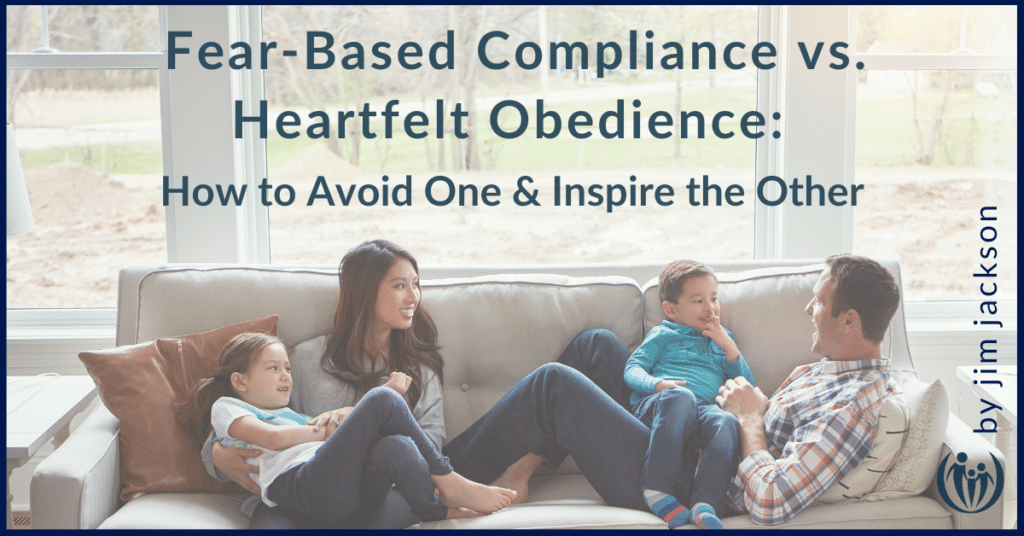
Fear-Based Compliance vs. Heartfelt Obedience: How to Avoid One & Inspire the Other

At a banquet I attended, I sat near a father and his two elementary-aged sons. The boys were playful, and I engaged with them the way I often do with young kids, purposefully playing, laughing, and connecting. When the host announced the program would soon begin, I planned to guide the boys to settle and be attentive.
But I never got a chance.
Dad quickly and sternly announced to the boys that it was time to be quiet. The boys heard but didn’t obey soon enough to satisfy him. He snipped, “Boys!” and glared angrily from one to the other. As the rest of the room slowly quieted down, they looked at him, and their expressions immediately changed from happy to scared. They sat still and tuned out, almost as if they needed to unplug from real life in order to keep their impulses harnessed. The dad looked at me and confidently proclaimed, “We’ve been working hard on immediate obedience, and it’s starting to pay off.”
Compliance is not the same thing as obedience
I was disheartened that somehow this dad, along with so many parents I meet, equated forced behavior with obedience. What I observed was not obedience at all. It was fear-based compliance. The boys did the right thing – not from a place of joy, or consideration for others, or from a heartfelt desire to obey and please their father – but from fear of whatever was coming next if they didn’t comply.
I see this sort of thing from parents often. Truthfully, as a young dad, I often expected immediate obedience from my kids, and I believed that if my kids obeyed immediately, then my discipline had “worked.”
A better question for parents to ask about discipline than, “Did it work?” is, “What did my child really learn?” Did my child learn wisdom, respect, and honor? Or just how to submit to angry intimidation?
Differentiating: Compliance vs. obedience
In thinking about this, it’s important to understand the differences between compliance and obedience. Compliance is doing what was asked of you, regardless of whether or not you agree it is a wise or worthy choice. Fear-based compliance is simply doing the action because you’re afraid of not doing it.
Obedience, at least as presented biblically, involves believing that doing what is asked of you is truly the right thing to do.
Luke 1:17 tells us that the answer for disobedience is not blind compliance but “the wisdom of the righteous!” …the wisdom to know that what God asks us to do is the very best choice, a gift to us and those around us.
Scripture also emphasizes the connection between a loving relationship and obedience. In Jesus’ final teaching of His disciples, He made this connection numerous times, including “Anyone who loves me will obey my teaching. My Father will love them, and we will come to them and make our home with them.” John 14:23
True obedience flows from love and strengthens love.
Why fear-based compliance does not lead to obedience
The message of discipline you received as a child might have sounded quite different, more like this, “Do what I say to do, or else…” The “or else” part may have involved taking away a favorite toy, losing a privilege, or even a spanking.
Obviously, there are consequences to disobedience, and there are consequences to ignoring wisdom. However, a harsh “or else…” approach to discipline leads to a parent vs. child dynamic. This diminishes, not strengthens relationship. If kids don’t feel emotionally safe and instead make decisions solely out of fear of the consequences, then fight/flight centers guide responses, not the frontal lobe of the brain where wisdom is seated.
Emotional safety lays the foundation for heartfelt obedience
An emotionally safe environment is one in which it’s safe to analyze a situation, question a request, and make a mistake. Most parents would want their kids to question unreasonable or harmful orders from someone. But you might feel less eager for them to question your order to go to bed!
So, how does emotional safety lead to true obedience in those practical day-to-day interactions?
- Safety is necessary to keep the cognitive areas of kids’ brains engaged and ready to learn or solve the problems they’ve created.
- Creating a safe environment builds trust and deepens the relationship, which strengthens a parent’s influence and builds cooperation.
- Safety and kindness help kids feel true remorse for their sin and leads them to genuine repentance. (Romans 2:4) Also, in the book of Matthew, Jesus taught that the son who was initially defiant but had time to reconsider and obey was the obedient son.
- Safety follows Paul’s example in 1 Thessalonians 2. “Just as a nursing mother cares for her children, so we cared for you… For you know we dealt with you as a father deals with his own children, encouraging, comforting, and urging you to live lives worthy of God.”
Creating safety in your home is an essential investment for the future of your family:
In our decades of experience helping parents, we’ve watched countless families grow from having young kids to young adults. We’ve seen that when parents work hard to create a culture of safety and wisdom-building at home, the deep, lasting respect of their children is the natural result.
Remember: you don’t have to sacrifice close relationships with your kids to be firm in your authority. You don’t have to give in for them to like you and respect you. Your family culture can be kind and firm – which is the basis for creating a safe home.
In going after your children’s hearts (instead of their outward compliance), you’ll be not just fostering true obedience but building the character that can make a wise choice when nobody has told them what to do. That’s what you really want.
What does it look like when a child obeys out of something other than just fear-based compliance? True obedience comes when children know they are responsible, capable, loved, and safe in your care. An 8-year-old child whose parents took the Discipline That Connects With Your Child’s Heart online course said it best: “Mom and Dad, I used to obey you because I was scared. Now I obey because I love you!”
If this echoes the desire of your heart for your children, you can learn to deepen loving connection with your kids as you instill in them the “wisdom of the righteous!”
Next steps in fostering heartfelt obedience in your home:
- Register for the Discipline That Connects With Your Child’s Heart online course. We offer the moderated version only once a year in the fall and would love to have you join us!
- Download the ebook Four Messages Every Child Longs to Hear.
- Listen to the podcast “What Does It Mean To Be an Emotionally Safe Parent?” where we dig deep into this issue of safety.
Ready to dive in and learn more about the Framework?
Our 8-session online course, Discipline That Connects With Your Child’s Heart will guide you through each level of the Framework. If you’re looking for a grace-filled way to parent, this course is for you!




